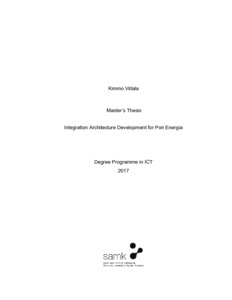Integration Architecture Development for Pori Energia
Viitala, Kimmo (2017)
Viitala, Kimmo
Satakunnan ammattikorkeakoulu
2017
All rights reserved
Julkaisun pysyvä osoite on
https://urn.fi/URN:NBN:fi:amk-2017123122628
https://urn.fi/URN:NBN:fi:amk-2017123122628
Tiivistelmä
Modern information technology systems today are nearly always divided into several enterprise applications and singe enterprise application is typically carried out by one software vendor with one architecture to implement one relatively limited role.
Function of system integration is to enable software development that connects multiple single sector software into one application that can monitor and manage the execution of business processes.
The aim of this study is to describe system integration and its requirements and objectives. This study also aims to demonstrate different integration technologies and architecture. Final goal is to analyse Pori Energia’s current integration system and construct new integration architecture and platform.
As a conclusion to the thesis can be stated that system integration is on the surface of digitalised world. Organizations are packed with different systems and software whose interoperability is business critical requirement. When well implemented, integration enables agility react to business changes and enhance daily efficiency fluency.
Function of system integration is to enable software development that connects multiple single sector software into one application that can monitor and manage the execution of business processes.
The aim of this study is to describe system integration and its requirements and objectives. This study also aims to demonstrate different integration technologies and architecture. Final goal is to analyse Pori Energia’s current integration system and construct new integration architecture and platform.
As a conclusion to the thesis can be stated that system integration is on the surface of digitalised world. Organizations are packed with different systems and software whose interoperability is business critical requirement. When well implemented, integration enables agility react to business changes and enhance daily efficiency fluency.
